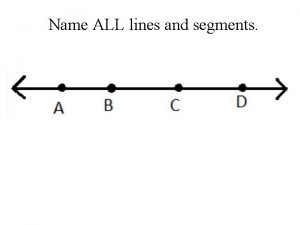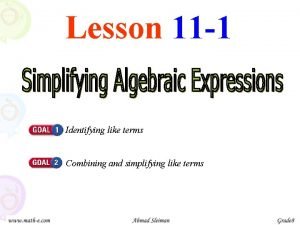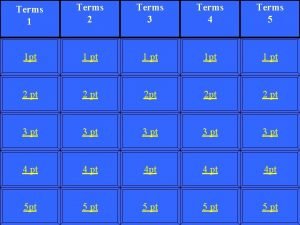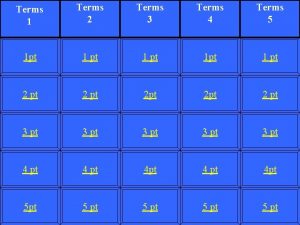Key Terms All of the key terms in



- Slides: 3

Key Terms All of the key terms in the ‘red’ boxes in the text book Abdication – A leader, like a king or emperor, giving up their throne or position. Communist – Communism is an extreme form of government, in which representatives of the workers set up a government and take ownership of all land, property and resources of the country. It was associated with Germany’s enemy, Russia. Constitution – The rules which set out how a country is run. Civil servant – Somebody who works for the government in some way. Trade unions – Groups of workers formed to protect the rights and interests of workers in various occupations. Electorate – People who are allowed to work in an electorate. Censorship – Censorship involves banning information or ideas. It sometimes involves banning the vehicles for delivering ideas, such as newspapers, pictures, radio or film. Censorship therefore controls attitudes by forbidding certain information or opinions. Propaganda – Propaganda is another way of controlling attitudes, but propaganda doesn’t ban opinions, it creates them. Propaganda uses things like newspapers, radio, posters and film, to put ideas in people’s minds and therefore shape their attitudes. Nationalism – A political outlook in which all policies are organised to make the nation stronger and more independent. Socialism – A political outlook which stresses that a country’s land, industries and wealth should all belong to the workers of that country. Paramilitary force – A private group run like a military force. Putsch – A violent uprising intended to overthrow the existing leaders. Real wages – A measure which reflects not the actual monetary value of wages, but the buying power of wages. _________________________________________ The following words or phrases also appear as headings or in bold text – make sure you are confident with these terms too. German revolution – overthrowing one form of government for another – the German version. Republic – form of government without a monarch. Armistice – formal agreement to end the war. Democratic – a form of government where the electorate chose their leaders by voting. Proportional representation – parliamentary seats awarded in proportion to the share of the votes cast for that party. President – chosen every 7 years by the electorate Electorate – all those who could vote Chancellor – chosen by the president; usually the leader of the largest party in the Reichstag.

Reichstag Central government Reichsrat Lander – local government Coalition government – when no party had a clear majority, several parties would join together to form a government. Diktat – refers to the Treaty of Versailles being imposed, not agreed War guilt – Article 231 of the Treaty of Versailles – statement that Germany had caused the war. Dolchstoss – Belief that the army had been ‘stabbed in the back’ (betrayed) by politicians. November criminals – The leaders of the new republic who had signed the Treaty of Versailles – they were resented for doing so. Extreme right-wing – parties who wanted strong government, a strong army, a powerful leader. Supported capitalism, championed families, law and order and traditional values. Placed the interests of the nation over those of the individual. Extreme left-wing – parties who wanted control in the hands of the people. Opposed capitalism, abolition of private ownership of land business. Internationalists who wanted co-operation with other nations rather than independence. Sparticists – extreme socialists. Freikorps – Demobilised soldiers organised into Free Corps units. Many were right wing and strongly opposed to the Communists. Kapp Putsch – right-wing uprising Inflation – When the price of things goes up. Hyperinflation – extreme and out of control inflation. Rentenbank – Temporary state owned bank set up by Stresemann. Rentenmark – Temporary currency issued by Rentenbank Reichsbank – independent national bank set up in August 1924. Reichsmark – currency controlled by the Reichsbank and backed by Germany’s gold reserves. SA (Sturmabteilung) – Stormtroopers – Nazi paramilitary force. Aryan race – what Hitler called the German race. He believed they were destined to rule the world. Totalitarianism – undemocratic; power in the hands of the state and preferably in the hands of one leader who would organise everything for the benefit of the people. SS (Schutzstaffel) – Protection squad – in charge of all the other police and security services The Enabling Act – change the constitution giving Hitler the right to make laws for four years without the consent of the Reichstag. Night of the Long Knives – 30 June 1934 – elimination of perceived opposition to Hitler through the shooting of approximately 400 people without a trial. These included members of the SA (e. g. Rohm) and leading politicians (e. g. von Schleicher). Police state – When the government uses the police and secret police to control what people do and say.

SD (Sicherheitsdienst) – Security Force Gestapo (Geheime Staatspolizei) – State Secret Police – Non-uniformed. Aim was to identify anyone who criticised or opposed the Nazi government. Concentration camps – new prisons run by the SA and SS. Inmates included ‘undesirables (e. g. homosexuals and prostitutes), minority groups that the Nazis disapproved of (e. g. Jews) and political prisoners (e. g. communists and political writers). Concordat – agreement between the Pope and Hitler. Resistance – refusing to support something. Opposition – actively working against something in order to remove it. Lebensborn – policy to support increased childbirth. Nurseries and financial support for women who had children with SS men. Later, it encouraged single women to breed with SS men to create ‘genetically pure’ children for worthy German families. Labour Service (RAD) – In 1933, provided paid work for the unemployed. From 1935, made compulsory for all young men to serve for 6 months in the RAD. Provided workers for public works e. g. repairing roads. Autobahns – motorway project planned 7, 000 miles of dual-carriageways. By 1938, 3, 500 km had been completed. The Labour Front (DAF) – the Nazi version of a trade union. Strength through Joy (Kd. F) – formed in 1933 to improve the standard of living for workers, e. g. through the provision of leisure activities. Beauty of Labour (Sd. A) – a division of Kd. F. Campaigned to get better facilities for workers such as canteens and toilets. Eugenics – the science of selective breeding. Herrenvolk – the master race. Untermenschen – Other races, such as Slavs, considered by Nazis to be ‘sub-human’. Lebensunwertes – unworthy of life. Lebensraum – extra living space Anti-Semitisism – Anti-Jewish ideas. Law for the Prevention of Hereditary Diseased Offspring – Made it compulsory for people to be sterilised if they were mentally ill, alcoholic, deformed, epileptic, deaf or blind. T 4 programme – 1939, Nazis ordered that babies with severe mental or physical disabilities should be killed by starvation or lethal overdose of drugs. Kristallnacht – 9 -10 November 1938 – widespread and destructive violence towards Jews and Jewish property including synagogues. Organised by Goebbels but presented as a reaction of ordinary Germans against Jews.





